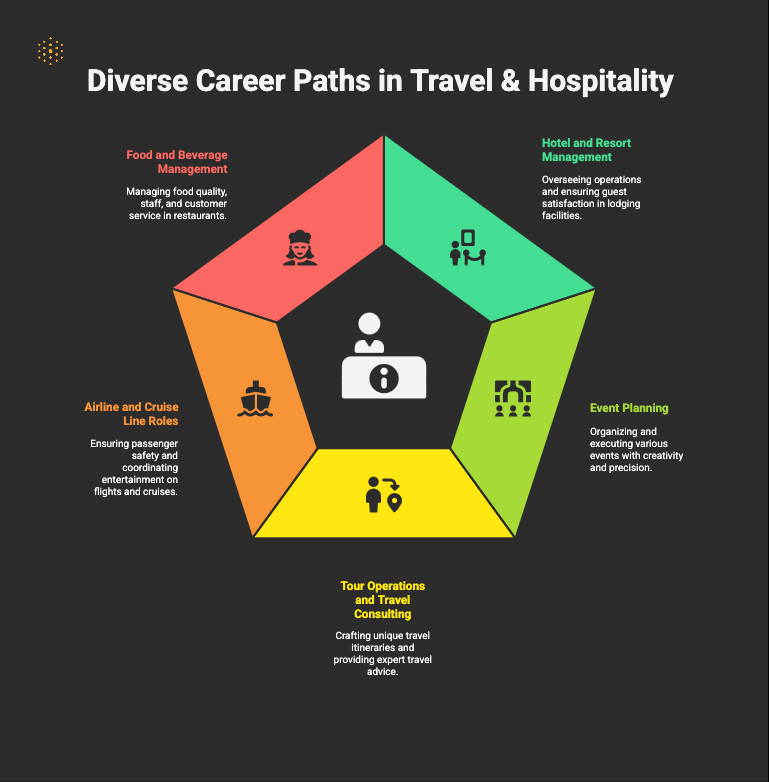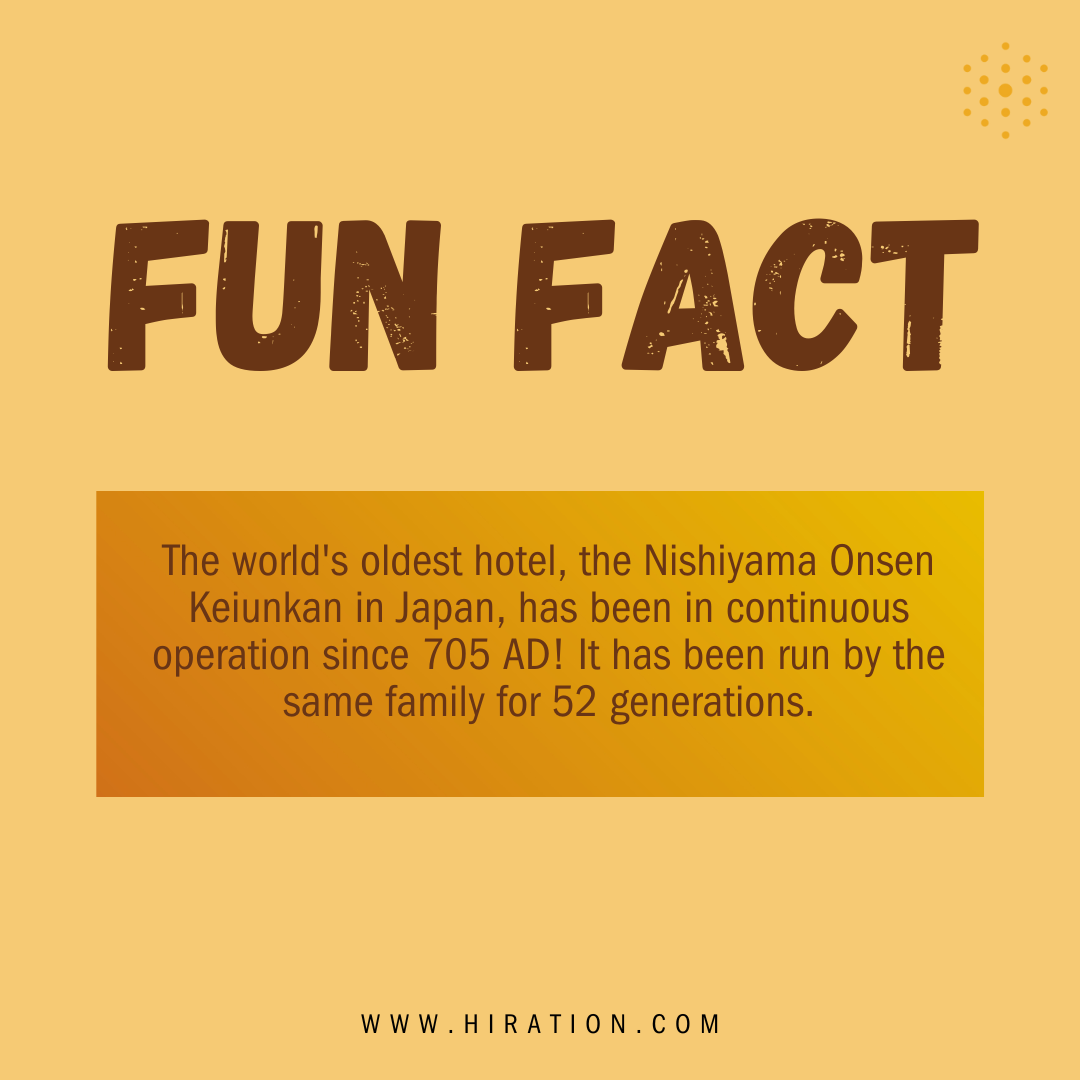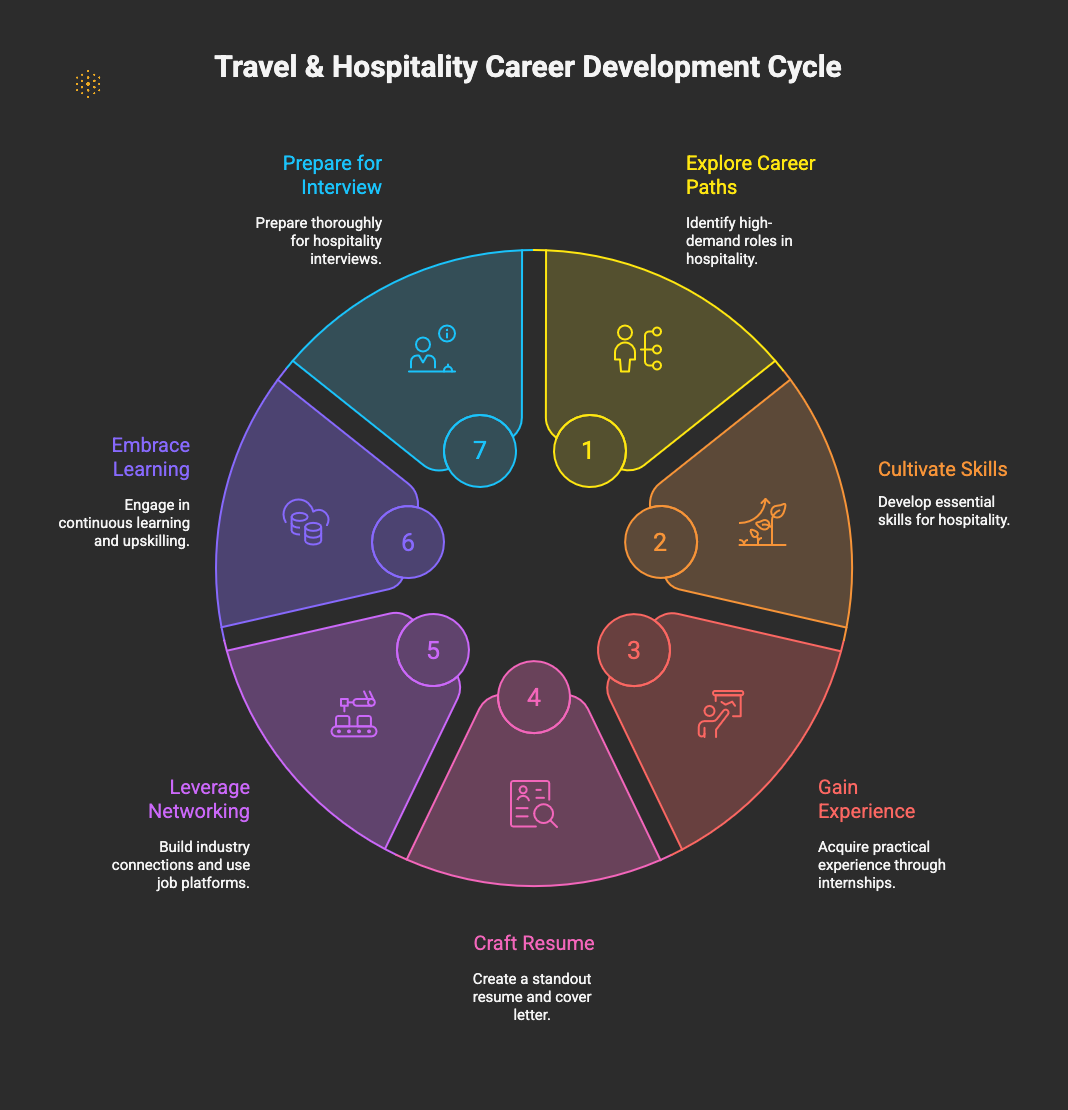The global hospitality industry is making a powerful comeback.
After a period of uncertainty, it's now projected to reach a staggering $4.7 trillion by 2027 - fueled by renewed travel demand, booming events, and evolving guest experiences.
This growth is creating massive opportunities for job seekers worldwide and there’s never been a better time to enter the field.
Whether you're passionate about hotels, airlines, event planning, or food and beverage, the industry offers diverse, people-centered roles with real career growth.
But how do you break in, and thrive, in such a fast-paced, competitive space?
Here are 7 actionable steps to build a rewarding hospitality career.
1. Explore High-Demand Career Paths
The travel and hospitality sector is incredibly diverse, offering a wide range of career paths to suit different skills and interests. Here are some of the most sought-after roles right now:
- Hotel and Resort Management: With the global hotel and accommodation market set to reach over $1 trillion in 2025, the demand for skilled managers is higher than ever. From boutique hotels to sprawling resorts, lodging managers are the heart of the guest experience. As a manager, you'll oversee daily operations, manage staff, and ensure guest satisfaction. For those with a knack for leadership and a passion for service, a career in hotel operations can be incredibly rewarding.
- Event Planning: The global events industry is a powerhouse, projected to be worth over $2.5 trillion by 2035. This creates a huge demand for creative and organized event planners. Event planners are the masterminds behind everything from corporate conferences and lavish weddings to music festivals. This role requires creativity, meticulous attention to detail, and the ability to thrive under pressure.
- Tour Operations and Travel Consulting: As international travel rebounds, the expertise of travel consultants and tour operators is in high demand. If you're a travel enthusiast with a knack for planning, you can help people create their dream vacations by designing unique itineraries and offering expert advice on destinations.
- Airline and Cruise Line Roles: Take your career to the skies or the high seas! The airline industry offers roles like flight attendant, where you'll ensure passenger safety and comfort. On a cruise ship, you could be a cruise director, coordinating entertainment and activities for guests.
- Food and Beverage Management: For the foodies at heart, a career in restaurant or food and beverage management is a perfect fit. You'll be in charge of everything from menu planning and food quality to staff management and customer service.

2. Cultivate Essential Skills
To succeed in the fast-paced world of hospitality, you need a specific set of skills. Here are some of the most important ones to develop:
- Communication and Interpersonal Skills: Clear and friendly communication is the bedrock of hospitality. You'll need to be a great listener and be able to interact with guests and colleagues from diverse backgrounds with empathy and professionalism.
- Customer Service Excellence: The entire industry is built on providing exceptional customer service. This means anticipating guest needs, resolving issues with a positive attitude, and consistently going the extra mile to create a positive experience.
- Teamwork: From the front desk to the kitchen, hospitality is a team sport. The ability to collaborate effectively with your colleagues is crucial for smooth operations and happy guests.
- Problem-Solving: Unexpected challenges are a daily occurrence in hospitality. Whether it's a guest complaint or a logistical hiccup, you need to think on your feet and come up with quick and effective solutions.
- Tech-Savviness: Technology is transforming the industry. Familiarity with property management systems (PMS), customer relationship management (CRM) software, and even AI-powered tools is becoming increasingly important.
3. Gain Relevant Experience
Hands-on experience is invaluable in the hospitality industry. Here's how to get it:
- Internships: An internship is a fantastic way to get your foot in the door. You'll gain practical experience, learn from seasoned professionals, and start building your professional network.
- Part-Time Jobs: Even a part-time job in a restaurant, hotel, or at a local event can teach you the fundamentals of customer service and teamwork.
- Volunteering: Volunteering at festivals, community events, or tourism centers can provide you with relevant experience and demonstrate your passion for the industry.

4. Craft a Standout Resume and Cover Letter
Your resume is your first impression, so make it count! To create a resume that gets noticed:
- Tailor it to the Job: Don't send a generic resume. Customize it for each job you apply for, highlighting the skills and experience that are most relevant to the role.
- Use Action Verbs: Instead of simply listing your duties, use strong action verbs to describe your accomplishments. Learn more about the right words to use from this list of resume action words and power verbs.
- Highlight Your Skills: Create a dedicated skills section that showcases your hospitality-specific skills, such as customer service, problem-solving, and any languages you speak.
- Write a Compelling Cover Letter: A great cover letter can set you apart from other candidates. Use it to tell your story, express your enthusiasm for the role, and explain why you're the perfect fit for the company.
5. Leverage Networking and Job Search Platforms
In hospitality, who you know often matters just as much as what you know. According to CNBC upto 80% of jobs are filled through personal connections, meaning most roles are filled through personal connections and internal referrals.
And while referrals make up just 6% of applications, they account for 37% of all hires, making them one of the most effective ways to get hired.
To stand out, start by building real relationships in the industry. Use LinkedIn to connect with professionals, engage with alumni groups, and follow hospitality employers.
Request short informational interviews to learn about career paths and stay top-of-mind when opportunities arise. Referrals are more likely when:
- You’ve shown genuine interest in someone’s work
- You maintain ongoing, two-way communication
- You ask for insight, not a job
Alongside networking, use hospitality-specific job boards like Hcareers, Hosco, and Caterer.com to discover roles tailored to your interests.
Don’t overlook career fairs and campus events as well. They’re still one of the best ways to connect with recruiters face-to-face.
6. Embrace Continuous Learning
Hospitality is constantly evolving with new technologies, shifting guest expectations, and global trends redefining the industry. To stay ahead, continuous learning is essential.
Start by identifying areas that align with your goals. For example, if you’re eyeing hotel management, earning a bachelor of hospitality management can provide a strong foundation in both areas and help you stand out in a competitive job market.
If you're interested in event planning, learn budgeting and logistics. Some practical ways to grow:
- Earn certifications in food safety, hotel management, event planning, or hospitality marketing. These signal your commitment to the field and set you apart in hiring.
- Attend industry webinars and workshops: many are free or low-cost and cover trending topics like sustainable tourism, AI in customer service, or diversity in hospitality.
- Follow hospitality blogs and publications such as Hospitality Net, Skift, or Lodging Magazine to stay updated on market shifts.
- Upskill with short courses on platforms like Coursera, edX, or LinkedIn Learning, especially in areas like digital tools, customer experience, and leadership.
7. Prepare for the Interview
Your resume gets you the interview, but your preparation gets you the job. Hospitality interviews aren’t just about qualifications; they’re about attitude, communication, and how well you connect with people.
Here’s how to show up ready:
- Research the employer thoroughly. Know their mission, values, key offerings, and guest demographics. Tailor your answers to reflect alignment.
- Practice behavioral questions using the STAR method (Situation, Task, Action, Result). Common prompts include “Describe a time you handled a difficult guest” or “How do you manage pressure during peak hours?”
- Highlight your soft skills. Hospitality is people-first, so showcase traits like empathy, patience, adaptability, and problem-solving.
- Prepare thoughtful questions to ask. Show curiosity about the company’s culture, training programs, or growth opportunities.
- Mind your presence. Whether in-person or virtual, dress professionally, smile often, and maintain confident body language.
Finally, let your passion come through. Employers want someone who genuinely enjoys helping people and creating memorable experiences.
If you combine polished preparation with authentic enthusiasm, you’ll leave a lasting impression and dramatically improve your chances of getting hired.

Final Thoughts
The hospitality industry is full of potential, but success doesn’t happen by chance. It takes clarity, preparation, and the right tools to stand out in a competitive, service-driven space.
Whether you're just starting out or planning your next move, applying these steps - from skill-building to networking, can give you a real edge.
And if you’re looking for extra support along the way, Hiration can help you stay ahead.
From building polished, ATS-friendly resumes to practicing mock interviews and optimizing your LinkedIn profile, Hiration is designed to help you feel confident and career-ready, especially in dynamic industries like hospitality.
The opportunities are out there. Now it’s your move.



